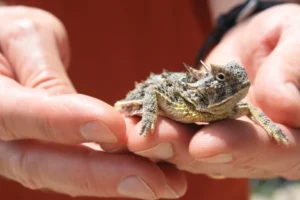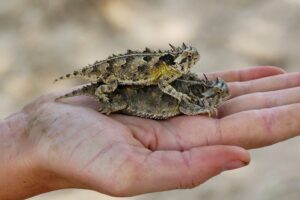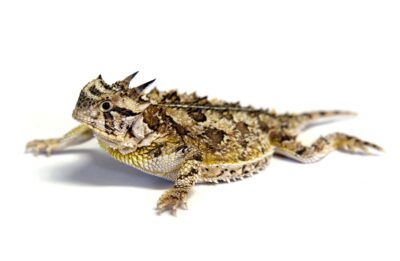Curious about what do horny toads eat? These fascinating creatures, also known as horny frogs or horned lizards, have a unique diet that’s just as interesting as their appearance. Found primarily in the arid regions of the southwestern United States and Mexico, horny toads have evolved to thrive on a diet tailored to their specific environment.
Understanding what do horny toads eat not only gives insight into their role in the ecosystem but also helps in providing the best care for those keeping them as pets.
What Are Horny Toads?

Horny toads, also known as horny toad lizards or horny toads, are a type of lizard belonging to the Phrynosomatidae family. Their scientific name is Phrynosoma, and they are native to North and Central America. Despite the name, they’re not actually toads; they’re lizards with a toad-like appearance.
Here are some interesting features and facts about them:
- Appearance: Horny toads are known for their distinctive, flattened bodies and spiny, horn-like projections on their heads and bodies. This gives them a somewhat toad-like appearance, which is why they have their common name.
- Camouflage: Their coloration and body shape help them blend in with their surroundings, such as rocks and desert sand, making them less visible to predators.
- Defense Mechanisms: When threatened, horny toads can puff up their bodies to make themselves appear larger. Some species can also squirt a stream of blood from their eyes, which can deter predators.
- Diet: They primarily eat ants and other small insects. Their diet is adapted to their environment, and they are well-suited to their arid or semi-arid habitats.
- Habitat: Horny toads are often found in desert or semi-desert regions, rocky hillsides, and open grasslands. They are well adapted to survive in harsh conditions with limited water sources.
- Behavior: They are mostly ground-dwelling and are often seen basking in the sun to regulate their body temperature. They tend to be solitary and are more active during the warmer parts of the day.
What do horny toads eat?
Horny toads primarily feed on ants and other small insects. Their diet mainly consists of:
- Ants: Many species of horny toads are particularly fond of ants and may consume large numbers of them. Their specialized feeding adaptations make them well-suited for this diet.
- Beetles: They also eat various beetles, which are another common insect in their habitat.
- Termites: Depending on availability, they may include termites in their diet.
- Small Insects: In addition to ants and beetles, horny toads will consume other small insects that they encounter.
Their feeding behavior is adapted to their environment, where these small, often plentiful insects are the main food source. Horny toads have evolved to efficiently hunt and consume these insects, which are essential for their survival in arid and semi-arid regions.
Foods to avoid
For horny toads, it’s important to avoid feeding them foods that can be harmful or unsuitable for their diet. Here are some foods to avoid:
- Fruits and Vegetables: Horny toads are insectivores and do not eat fruits or vegetables. These can be difficult for them to digest and provide no nutritional benefit.
- Large Insects: Avoid feeding them large insects that they might have trouble eating or digesting. This includes large beetles or cockroaches that are too big for their mouths.
- Human Food: Processed human food, including junk food or foods with additives and preservatives, should not be fed to them. These can cause health issues and are not nutritionally appropriate.
- Live Prey Larger Than Their Head: Ensure that the live prey you offer is appropriately sized. Insects or other prey should be smaller than the width of the horny toad’s head to avoid choking or digestive issues.
- Pesticide-Contaminated Insects: Avoid feeding them insects that have been exposed to pesticides or other chemicals. These can be toxic and harmful to the horny toad.
Maintaining a diet that closely mimics their natural food sources and avoiding inappropriate foods will help ensure their health and well-being.
Common health problems related to diet

Horny toads can experience various health problems related to diet if they are not fed appropriately. Common issues include:
- Nutritional Deficiencies: A diet lacking in essential nutrients can lead to deficiencies. For example, a lack of calcium and vitamin D can cause metabolic bone disease, resulting in weak or deformed bones.
- Obesity: Overfeeding or feeding inappropriate foods, such as too many fatty or large insects, can lead to obesity. This can cause issues such as difficulty moving and increased susceptibility to other health problems.
- Impaction: If they consume insects with indigestible parts or if their diet is not varied enough, it can lead to gastrointestinal impaction. This is a condition where indigestible material blocks the digestive tract, potentially causing serious health issues.
- Dehydration: A diet lacking in moisture can contribute to dehydration. Insects alone might not provide sufficient hydration, so it’s essential to ensure they have access to water and a suitable environment.
- Parasites: Feeding them wild-caught insects can introduce parasites into their system. These parasites can cause various health issues, including weight loss, lethargy, and digestive problems.
- Digestive Issues: Inappropriate or irregular feeding can lead to digestive problems, including diarrhea or constipation.
Maintaining a balanced diet that mimics their natural feeding habits and avoiding harmful or unsuitable foods is crucial for keeping horny toads healthy. Regular health check-ups and monitoring their diet can help prevent and address these issues.
Symptoms of malnutrition or improper feeding
If a horny toad is suffering from malnutrition or improper feeding, you might notice several symptoms. Here are some common signs to watch for:
- Weight Loss: Noticeable weight loss or a decrease in body mass can indicate malnutrition. The toad may appear thinner or have a sunken appearance.
- Lethargy: An unusually low energy level or lethargy can be a sign of poor nutrition or health issues.
- Poor Skin Condition: Skin problems, such as dryness, flakiness, or irregular shedding, can result from nutritional deficiencies.
- Deformities: Metabolic bone disease, often due to a lack of calcium and vitamin D, can cause deformities in bones, such as curved spines or swollen limbs.
- Impaired Digestion: Issues like constipation or diarrhea can arise from improper feeding or dietary imbalances.
- Reduced Appetite: A decrease in appetite or refusal to eat can signal health problems or an imbalance in their diet.
- Sunken Eyes: Dehydration or severe malnutrition can cause the eyes to appear sunken or dull.
- Abnormal Behavior: Changes in behavior, such as hiding more than usual or an increase in stress behaviors, might be linked to dietary problems.
- Fluctuations in Activity Levels: Irregular activity patterns, either increased lethargy or hyperactivity, can be related to dietary issues.
If you notice any of these symptoms, it’s important to adjust their diet accordingly and consult with a reptile vet to address the underlying causes and ensure proper care.
When to seek professional advice
You should seek professional advice from a reptile vet or a herpetologist if you notice any of the following signs in your horny toad:
- Persistent Symptoms: If you observe any of the symptoms of malnutrition, illness, or improper feeding for more than a few days, especially if they worsen or don’t improve with dietary adjustments.
- Severe Weight Loss: Significant or rapid weight loss that doesn’t seem to be improving could indicate a serious health issue requiring professional evaluation.
- Difficulty Eating: If your horny toad consistently refuses to eat or has trouble catching and consuming food, it may need a vet’s assessment.
- Unusual Behavior: Dramatic changes in behavior, such as increased lethargy, aggression, or hiding, can be signs of underlying health problems.
- Physical Deformities: Any noticeable physical changes or deformities, such as swollen limbs, irregular bone growth, or abnormal shedding, should be checked by a professional.
- Digestive Issues: Persistent constipation, diarrhea, or signs of impaction (such as a bloated abdomen) warrant a vet’s attention.
- Skin Problems: Significant or persistent skin issues, such as dryness, flakiness, or abnormal shedding, could be related to nutritional deficiencies or other health issues.
- Respiratory Issues: If you notice signs like labored breathing, nasal discharge, or coughing, these could indicate respiratory infections or other serious conditions.
- General Health Concerns: Any general concerns or uncertainties about your horny toad’s health or well-being should be discussed with a professional to ensure proper care.
Early intervention by a vet can help address health issues effectively and improve your horny toad’s overall well-being.
Conclusion
What do horny toads eat? Horny toads primarily feed on ants and other small insects, including beetles and termites. Their diet is adapted to their environment, where these insects are abundant and suitable for their needs.
Providing a varied diet of appropriately sized insects helps ensure their health and well-being. Avoiding unsuitable foods like fruits, vegetables, and large prey is crucial to prevent health issues.



